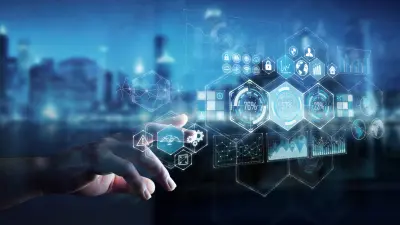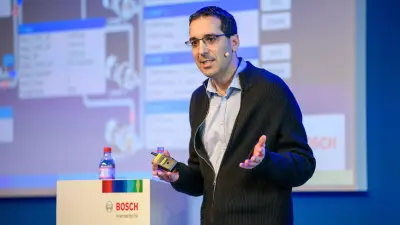“We’ll be talking about Building IQs”

Vera Schneevoigt, Chief Digital Officer and Senior Vice President responsible for Engineering at the Bosch Building Technologies Division, and Marcus Nadenau, Senior Vice President Energy and Building Solutions Europe, talk about new opportunities arising from digitalization.

Ms. Schneevoigt, Mr. Nadenau, digitalization is a mega-trend that affects us all. How is it influencing the field of commercial buildings?
Vera Schneevoigt: Digitalization is triggering major new developments and opening up many ways to increase safety, comfort, and efficiency. But it is a very complex process and is also closely linked to a lot of other trends in areas like energy, climate protection, and sustainability, to name a few. For new buildings, we’re now seeing many trades, architects, planners, installers, and operators devoting a lot of attention to digitalization. For our part at Bosch, we’re already very good at contributing building technology and management as a system integrator.
Marcus Nadenau: As far as overall building intelligence goes, there are already some concepts on the market, but they’re not very widespread. In five or ten years, I think we’ll be talking about building IQs.These IQs will tell us many things.
It tells us for example how the building supports us in our work and other processes.And we’ll get there by analyzing data in intelligent ways. This is an important area that we’ll be utilizing to advance new services for our customers.
"We’re shifting from the real world with its hardware to a world that uses a digital image of our buildings."
Will greater digitalization also mean greater demands on Bosch as a system integrator?
Marcus Nadenau: Yes, because we’re shifting ever more from the real world with its hardware to a world that uses a sort of digital image of our buildings – or “digital twins.” New business models are arising along with professional services that rely on many different domains. Consultancy is playing an ever greater role. But in terms of the direct connection with our end customers, nothing has changed.
Are we also talking about providing building intelligence as a service?
Marcus Nadenau: Over the long term, yes. In ten years we’ll be offering many more services relevant to intelligent buildings. Imagine a virtual assistant in a conference room, for example, that hosts meetings as efficiently as possible and draws attention to unequal speaking time, or helps with translations. Data can be used to create a lot of similar possibilities. But buildings will not get an IQ of 155 overnight. There are some important intermediate steps. Data security, for example, is a crucial issue. That’s why, since last year, we’ve been offering services that protect against cyber attacks.

Vera Schneevoigt: Digital twins, which give us comprehensive copies of buildings with relevant aspects including all the technologies, systems, and sensors, are helping us develop these types of services. That used to be a very time-consuming, manual process with individual systems. But digital twins provide a completely new level of transparency and also enable new ways of integrating buildings actively into our living and working environments.
However, we shouldn’t overlook the fact that many factors are influencing our previous views and habits. Just one example: right now I live in this location and commute to a certain building for work – will that remain the case as our work environments become ever more agile and digital? These and other trends are opening the door to new needs and expectations on the part of both users and decision makers – all of which we are considering in how we develop the relevant services.
"AI turns objects into intelligent assistants and makes our lives easier."
Bosch considers AI (artificial intelligence) to be a crucial technology for the future. How important is AI for your field of work?
Marcus Nadenau: We’re using AI right now in Aviotec video-based fire-detection systems. We’re also exploring AI in other video-based applications. We’re using AI algorithms in our energy management solutions to predict future consumption patterns and thus avoid unnecessary costs arising from situations like peak loads.
Vera Schneevoigt: AI lends itself well to decision and use-based management – especially considering how difficult it would be for people to do it all on their own. AI turns objects into intelligent assistants and makes our lives easier in the process. For example, we’re working with other Bosch divisions to test ways of using video technology in connection with the sensors in self-driving cars to develop an integrated traffic management system.
Can you see further potential here?
Absolutely. We have already done a lot of work regarding the connectivity of our products and are now taking the next steps with services such as in-store analytics or the video-based fire detection system Aviotec. Another example is condition monitoring, a service that builds on remote maintenance. This gives customers an ongoing overview of the condition of a system, for example, the degree to which a fire detector is contaminated. This enables maintenance work and necessary investment to be planned in advance and to avoid system malfunctions. But there will also be many other steps to follow. Particularly in the area of security and building technology we have the opportunity to bring together all aspects of IoT and digitalization – i.e. hardware, software, data, and new technologies like artificial intelligence – and to create solutions for our customers that are of considerable value. I find it very exciting to be part of this development.
Where do you see the biggest opportunities in the future for ‘creating added value for the customer’?
For me there are three areas in particular: connectivity and intelligence, sustainability, and security. That means that the manufacturer’s promises to be able to use data more intelligently are also realized in practice. Through our close customer contact and by combining technical expertise with new technologies we are perfectly positioned to create this real benefit. Also, it’s increasingly about sustainability. In buildings this particularly means the increasing need for efficiency, so automation and control systems are needed, and energy consulting will ultimately also play an increasingly important role. And finally in a global world security in itself is important. Alongside the safety of people, this also means data security. The need for security was and still is a very important one. I think it’s great that, as industry experts, we can contribute to fulfilling this need.

What demands is greater digitalization placing on associates?
Vera Schneevoigt: Digital expertise requires life-long learning, and it affects nearly every level of the company. At a company like Bosch, associates essentially receive free training in digitalization – merely working for Bosch is a form of continuing education in the area. The question is not only what opportunities we have today, but also what we will need for the future. What types of training can we offer people who come from other fields, and what types of additional qualifications are on offer? We’re working intensively on these matters.
Marcus Nadenau: Absolutely, we’re investing in the digital skills of our associates. And we’ve been focusing our organization on these market dynamics since the beginning of the year. We’ve been concentrating more on our intelligent building solutions, for example, and are consolidating key areas of expertise.
Are you involving customers directly in developing these new ideas and solutions?
Marcus Nadenau: That’s very important to us! We’re developing solutions and services that are very closely tailored to the needs of our customers. We enter into joint development agreements with them, in which both sides contribute and benefit equally. We solicit UX feedback from our customers, adapt our processes accordingly, and keep testing them. We view ourselves as a partner who plays an active role in the digital transformation processes of our customers.
Vera Schneevoigt: Yes, we’re a very interesting partner for our customers. The whole Bosch ecosystem gives us a lot of room for innovation in the Building Technologies division. Moreover, we have the technological resources not only to shape our own digital transformations but to provide our customers with the best possible solutions.
Can you see further potential here?
Absolutely. We have already done a lot of work regarding the connectivity of our products and are now taking the next steps with services such as in-store analytics or the video-based fire detection system Aviotec. Another example is condition monitoring, a service that builds on remote maintenance. This gives customers an ongoing overview of the condition of a system, for example, the degree to which a fire detector is contaminated. This enables maintenance work and necessary investment to be planned in advance and to avoid system malfunctions. But there will also be many other steps to follow. Particularly in the area of security and building technology we have the opportunity to bring together all aspects of IoT and digitalization – i.e. hardware, software, data, and new technologies like artificial intelligence – and to create solutions for our customers that are of considerable value. I find it very exciting to be part of this development.
Where do you see the biggest opportunities in the future for ‘creating added value for the customer’?
For me there are three areas in particular: connectivity and intelligence, sustainability, and security. That means that the manufacturer’s promises to be able to use data more intelligently are also realized in practice. Through our close customer contact and by combining technical expertise with new technologies we are perfectly positioned to create this real benefit. Also, it’s increasingly about sustainability. In buildings this particularly means the increasing need for efficiency, so automation and control systems are needed, and energy consulting will ultimately also play an increasingly important role. And finally in a global world security in itself is important. Alongside the safety of people, this also means data security. The need for security was and still is a very important one. I think it’s great that, as industry experts, we can contribute to fulfilling this need.


